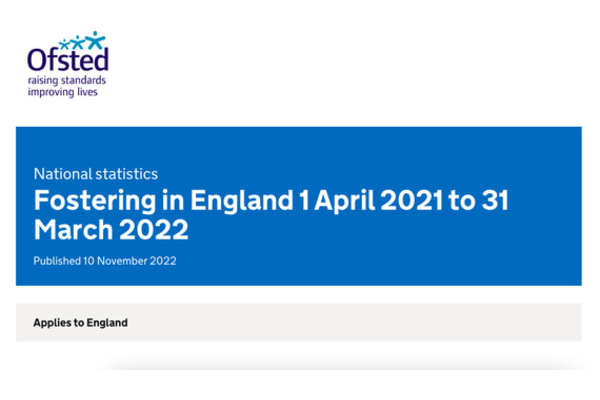The Care Review in England have published their Case for Change and I’ll say a bit more about some of the themes I pulled out below. I can’t help but think, though, that they missed an opportunity to say something positive about care and fostering. Most children in foster care do well most of the time. And probably better than they would have done if they had not been in care. But you’d never think that if you followed the national debate. That’s something we need to change for the sake of children in care hearing these messages, as well as prospective foster carers and social workers.
Effective models of commissioning: local government has been trying to address these challenges for well over a decade. NAFP has a long history, as well as current knowledge, of commissioning practice and its strengths and weaknesses. In our view there are few models of effective commissioning within children’s services, and few that have been robustly and independently evaluated. Our paper How well are fostering services commissioned? (December 2017) is still relevant to current practice.
Comparing costs of local authority ‘in-house’ fostering and IFA services: too many local authorities still state that their in-house services are cheaper than IFA services, and use this to justify only considering their own carers for a child in the first instance. Even if this were true, ‘cheapest first’ should not be the basis for choosing care for children. It is, in fact, not the case anyway and we outlined this in our briefing ‘Comparative unit costs of foster care’ (July 2016). IFAs generally care for older young people with higher needs and spend more on their services. Local authorities tend not to fully cost their own fostering services, nor do they compare like-for-like services with IFAs. IFAs provide additional services which address stability and risk, undoubtedly resulting in fewer placement breakdowns as a result.
Outcomes: it is not possible to assign responsibility for outcomes to one element of the support around a child. In this sense, ‘commissioning for outcomes’ is a flawed concept. Although foster carers are very important in the lives of children, it may not be possible for the care system to level up outcomes for children with traumatic pre-care experiences. That said, we should of course expect foster care to make a positive impact on the lives of children. The statutory system for assessing and reviewing childrens’ needs is not captured in such a way that enables local authorities to understand what this impact is. This is accompanied by a bureaucratic system of contract monitoring running in parallel with the statutory system.
IFA fee increases: we recently undertook a study with a range of IFAs - large, medium, small; private, charity, not-for-profit; geographically dispersed. Our study suggests that over the last six years:
- On average, IFAs fees for most children living with their foster carers have increased by 5-7%, over a period when inflation has increased by around 15% - that is a significant real terms decrease
- Over that time, the complexity of needs of children living with IFA foster carers has increased, so IFAs are spending more on their services to support foster carers
- The fees of IFAs which are lowest have increased slightly more, while the fees of IFAs which are highest have decreased; having the impact of bringing all fees closer to the average
- There is a cohort of children with complex needs living with foster carers who would previously have been living in children's homes (at a higher cost); some local authority average fee calculations include these placements and do not accurately reflect the broader picture for most children living with IFA foster carers
- Against this fall in fees, Ofsted still judge IFAs to be 93% good or outstanding
IFAs offer extremely good services at good value for money. If we are to make radical changes to the system, let us not lose the great contribution that IFAs have made and are making to the lives of children.
Sufficiency: problems with a lack of sufficiency seem to be understood as meaning that local authorities are unable to find the placement they require for an individual child with particular needs at the time that they need in the place that they need it. It may be the case that this will never be possible. Sufficiency is broader than having carer vacancies - it is about the needs of the child needing to be recognised.
Local placements: for many children, remaining close to their family and community may be a good thing. This may also be administratively easier (though the child’s needs should come first). Sometimes a child who has been traumatised may heal better living away from home where reminders of their trauma could be repeatedly triggered. Some children benefit from a fresh start to heal and then progress. There seems to be a narrative about IFA placements always being further afield. IFA carers are already in the local pool of carers that could be available to local authorities. What would help is a true partnership of recruitment and no ‘poaching’ of carers. All local authority and IFA foster carers should be valued and respected equally.
Referrals: the quality and timeliness of referrals is a pinch point. At a basic level, the information within referrals could be improved (see our briefing ‘Placement referral information’ April 2019), involving current or past foster carers more commonly than in current practice. Honest and transparent referrals will not mean that carers will not consider the child, but the IFA may be able to suggest a creative package of support. Local authorities also need to rethink their policy of trying to find an in-house placement in the first instance - this cannot be in the best interests of children nor best use of public funds (see our briefing ‘Achieving the most appropriate placement for every child in care’ April 2015). IFAs do not ‘pick and choose’ referrals, as suggested in some quarters. Their overriding concern is to find the best match and a carer who will be able to meet a child’s needs. This becomes more difficult when carers have other children already living with them.
IFA foster carer retention: retention rates in IFAs are generally good - this should be celebrated and recognised. The duty of care, approach to support and learning and development are all key, as well as a familiar voice when requiring support out of hours. Fostering agencies are now helping foster carers to adjust to a partly virtual world, yet still engage with face-to-face training and support groups. There remain problems with the voice of foster carers being valued by other adults around the child including social work, education and health professionals. The sheer number of other professionals visiting, questioning and directing carers often undermines the carer's ability to support the child. This needs to be urgently addressed in the interest of children and retention of carers.
Staying Put: under-funded since its inception and suffering from some of the poor planning we have seen in leaving care for some years (see our report ‘Staying Put in Independent Foster Care: working together, getting it right’ December 2015). Local authorities are too often unable to fund the support a young person and (former foster) carer need to sustain a positive relationship. Too often, local authorities are unwilling to involve the IFA in Staying Put, putting at risk the very stability that has made Staying Put a possibility.
The Case for Change, The Independent Review of Children's Social Care, July 2021









